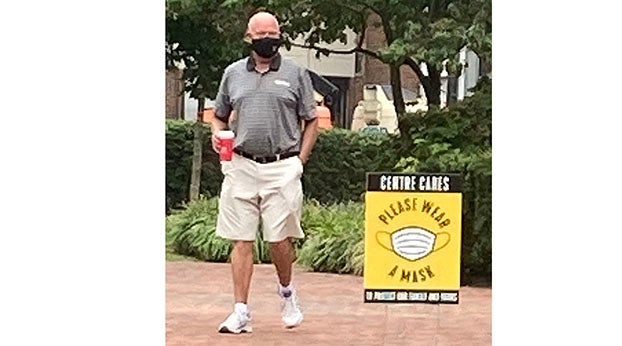Centre College keeping track of virus ‘in-house’
Published 2:00 pm Friday, September 25, 2020

- Wearing masks and being safe on Centre College's campus is part of what is helping students and others stay nearly COVID free recently.
Centre College students, faculty and staff are adapting to COVID-19 protocols and restrictions in ways that only a small college can do, and the low number of positive cases is a testament to their endeavors.
The college has its own trained contact tracers; it’s using a specialized COVID app developed by campus IT staff, and it conducts frequent testing of everyone on campus, according to Chief Communications Officer Michael Strysick. Of course everyone is also required to wear face masks, and are strongly urged to practice social distancing and frequent hand washing, he added.
On Centre’s homepage COVID-19 dashboard, at centre.edu, as of Thursday, Sept. 24, it showed the cumulative positivity rate for students was 0.32% since Aug. 1. and 0.00% over the past seven days. There were no new cases reported within the past seven days with a total of 10 positive cases reported since Aug. 1. Also, 3,118 COVID-19 tests were administered since Aug. 1 with 349 new tests administered within the past seven days.
The faculty and staff cumulative number of tests given since Aug. 1 was 646 with 117 new tests given in the past seven days. Three positive cases have been reported and tracked since Aug. 1 and no new cases were reported within the past seven days. The cumulative positivity rate since Aug. 1 was 0.46% and 0.00% over the past seven days.
The students, faculty and staff cumulative positivity rate combined was 0.35% since Aug. 1 with a total of 13 positive cases reported since that time
Strysick said the college updates the figures daily and posts them on its website in order to be “completely transparent” to the community about its infection rates.
In Kentucky as of Sept. 23, the average positivity rate was 4.59% over the past seven days.
According to the Kentucky Public Health website, as of Sept. 23, Boyle County had a positivity rate of 0.42 with a total of 266 cases.
Head Athletic Trainer Jamie Gay said after the college sent all students home in March and the administration began making plans for the return of students in August with no fall sports scheduled, it became apparent that he and his team of athletic trainers could serve as contact tracers.
“With us being licensed healthcare professionals (as athletic trainers) it just became a perfect match for me and our staff. We act as case managers anyway. We manage the healthcare of our student athletes,” Gay said, which is about 43% of the student body.
He, along with his staff, T.Y. Fisher, Mattie Zimmerman, Bobby Madden and Chloe McKay, took a five-hour online course from John Hopkins University. They also spent an afternoon training at the Boyle County Health Department on its policies and procedures for contact tracing.
They’re also working with Kathy Jones, director of student health at Centre.
BCHD Director Brent Blevins said he was very happy that Centre was taking charge of managing the students’ COVID-19 tracing efforts whenever a new positive case is reported. He said having Centre contact trace its students allows the health department staff to focus on tracing efforts in the rest of the county.
One of the tools that the contract tracers are using is an in-house app developed and designed by Centre’s IT staff, Strysick said. “It’s amazing work.”
Individuals sign into the system and complete a daily COVID-19 symptom health check on their computer or cell phone. If the person is determined to have virus symptoms, the app provides them with information as to what to do and how to follow up with healthcare providers.
If no symptoms are detected, the screen will display a green border around the information and the person will show it as their daily COVID pass to be allowed into classrooms, the library, dining hall and other campus facilities, he added.
Within this system, contact tracers can also access a person’s residence location, who their roommates are, who is in their “pod”, who is in their residence hall and what classes they’re in. “It’s really a great tool for contact tracing,” Gay said.
“Frequent testing and contact tracing are really some of the only tools we have right now, until a vaccine is available,” he said.
Strysick added that the college wanted to develop the COVID-19 screening app “in house” and not through a third-party for privacy and security reasons. Only those who are doing the contact tracing have access to the information. Strysick said, “It is on a need to know basis. Information isn’t floating around.”
Gay said he is “very pleased” that the school’s meticulous COVID-19 plan that was worked out over the summer, along with the students’ participation in it is helping to keep the campus positivity rate low.
“I’ve been thanking the students and athletes. … They are doing the hard work of wearing the mask … they’re required to wear at all times, even while exercising and practicing,” Gay said.
“It’s not what they would want to do, but they’re doing it because they want to be able to do what they love to do and that’s play athletics and compete here at Centre. And they want to stay here, so they’re working hard to make that happen.”






